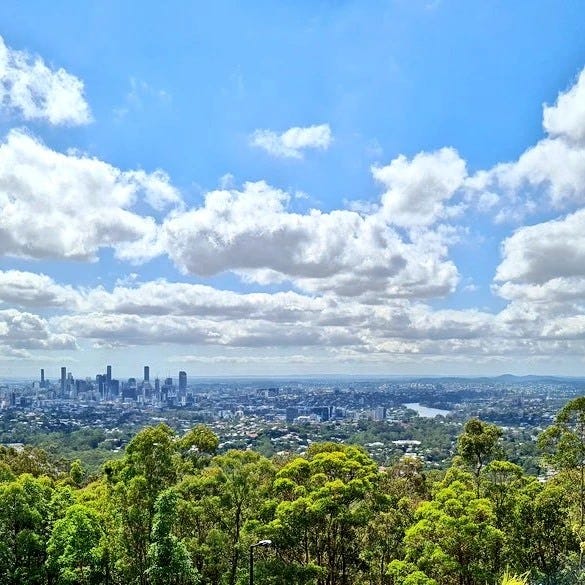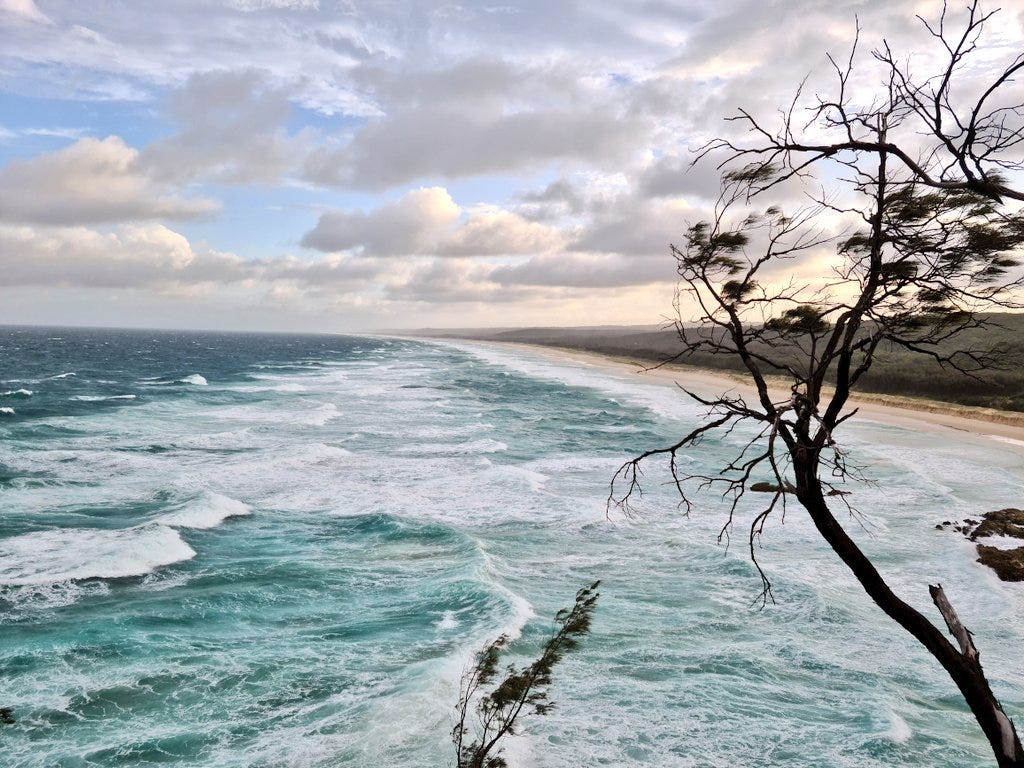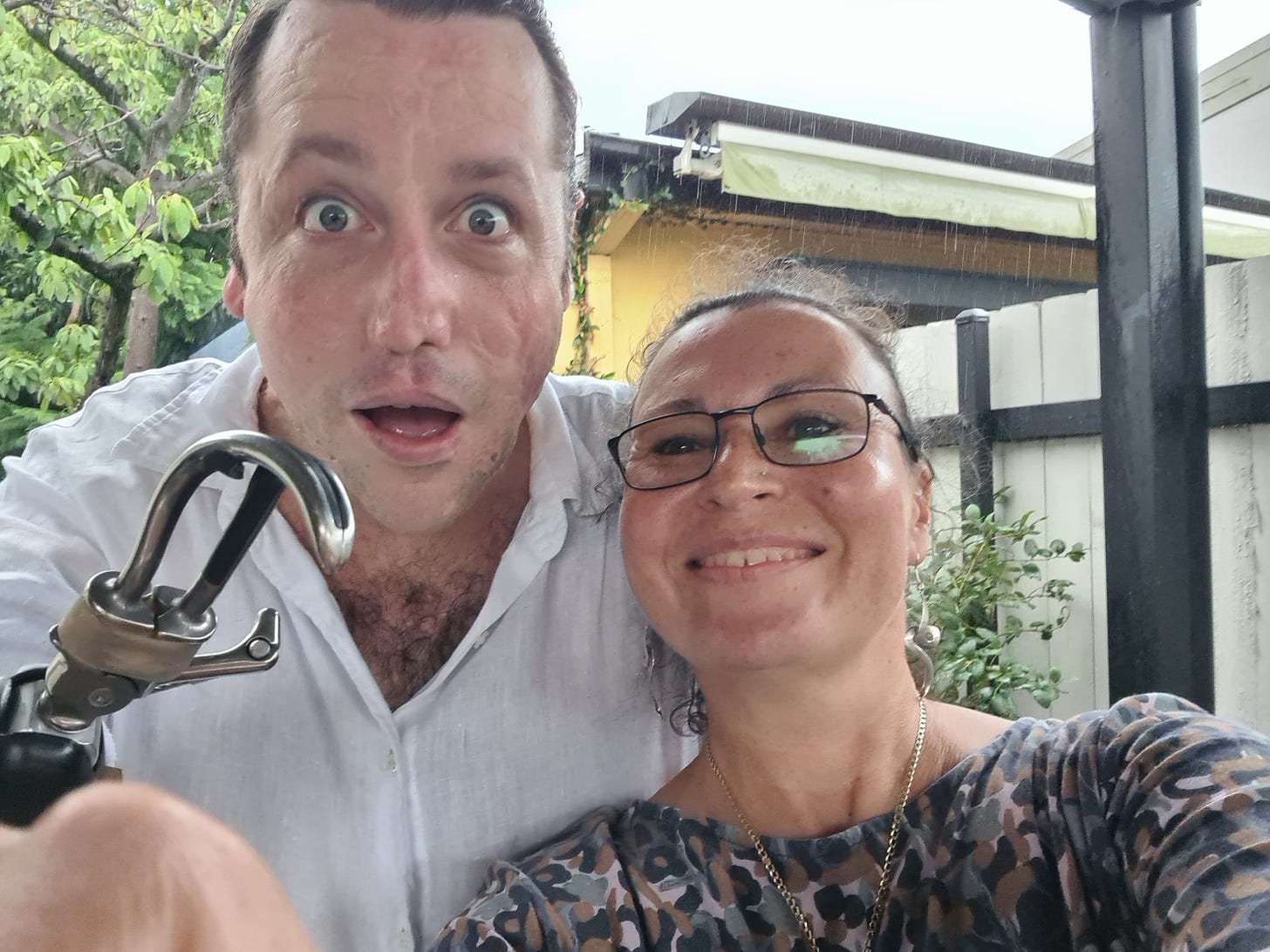The Eye of the Beholder
Beauty in Brisbane
“I wish I were the kind of person who never has passionate crushes on people!” I once told a friend. “Like, a dead motherfucker, you mean?” he replied.
Well, the good news, my friends, is that I am clearly very much alive, though I am smarting from the pain of romantic rejection: and I was rejected on the basis of my looks.
I forced this information out of the man, at the cost of awkwardness on both sides. He would otherwise have been too gentlemanly to say any such thing, but for my own satisfaction I needed to hear it explicitly stated. I cannot leave room for doubt in such matters: I am too prone to wishful thinking. The hope at the bottom of my Pandora’s Box is a stubborn little creature, as pertinacious as a sandfly. I needed him to dispatch it with the same thoroughness as he did the sandflies that pursued us along the endless beaches of Stradbroke Island, where he would take a flipflop in each hand, stand poised like a percussionist waiting to clash his cymbals together, before delivering the fatal blow and then bending down to slap the tiny body that had dropped onto the egg-white foam of the tideline to ensure it was fully, definitively dead.
It’s counterintuitive how painful it is to be rejected on the basis of looks. I would have preferred it had he not wanted a relationship with me because he found me pretty, but dim-witted or annoying. Had we simply not got along, I wouldn’t feel so much wistful longing. But in fact, our compatibility seemed striking to me and he seemed to agree. “I reckon we would complement each other, hey,” he told me, as we perched on the wooden swivel seats of Felons, watching the Brisbane River grow wine-dark in the cool of evening. I think we would. If only I looked different.
I have little say in how I look and yet it is a deeply important part of what I have to offer any potential lover. Looks themselves may be superficial, but our intuitive responses to them are not: they have been shaped by billions of years of evolution. They lie far below the level of conscious control and to become lovers we must penetrate that deep, we must scuba dive down past the layers of intellectual conversation and mutual appreciation, of shared interests and experiences—past all those things that are the beachhead of the self. It’s lovely to stroll on the beach, side by side, among the stone curlews stalking elegantly across the sand and the scurrying ghost crabs, amid the flotsam of bluebottle jellyfish, which leave ribbons of ultramarine on the sand, like carelessly overturned inkwells. It feels companionable, reassuring. “You’re a safe space,” he told me. But for love to flourish, we would have to venture out into the turbulence of the waves, to trespass on the domain of the leopard shark, the manta ray and the loggerhead turtle. We would need to ignore the ferocious signs that warn no swimming and let the rip tide carry us far, far out to where all attempts to swim are futile and we are just tossed about by the waves. And to want that, he would have to find me beautiful.
As Christopher Hitchens once put it (in a much more tragic context), “It’s no fun to appreciate to the full the truth of the materialist proposition that I don’t have a body, I am a body.” To my mind’s eye, I am the same person that I was at twenty, when my tummy was flat and my eyes symmetrical and my bottom lip full and pouty. But in reality I am a kind of reverse ship of Theseus: over the years, new timbers have been replaced with splintered old ones; taut rigging with frayed ropes. My boards are sea-warped and my water supplies brackish. The HMS Iona is not seaworthy enough for this Brisbane-bound voyage.
The contrast between my inner vision of myself and the objective reality of what others see was brought home to me recently, when I gave a tango performance in Sydney, after five years of having danced very little. I loved the experience of gliding and corkscrewing across the polished parquet of the opulently retro Mad Men-like foyer of the executive floor of the University of Technology, in the embrace of lovely local dancer Sonny Ho. But what I saw afterwards, watching the video that was taken, came as a bit of a shock. It’s not that I looked terrible: it’s just that I had somehow believed that I would look exactly as skilful, expressive and graceful as I did while at the height of my powers, when I was practising for six hours a day. I had been unconsciously hoping that time stood still for me, that I could dip back into the waters of the past at the same point in their stream, as if the past really were another country I could visit, and as if I could encounter my past self there, unchanged, and don it like a favourite dress. As in love, so in dance, the feeling in my heart is the same as it has always been, but the outward visual manifestation is different—and less likely to be appealing. (Some of the words of the song to which we danced—“Fuimos,” lyrics by Homero Manzi—seem sadly appropriate right now: “Don’t follow me, don’t call me, don’t kiss me, don’t cry for me. Stop loving me!”)
It is possible, sometimes, for the eye to adjust, for that tyrant Beauty to be dethroned. A few weeks ago, I was sitting with friends in a Sydney beer garden when I spotted a grotesque figure with hooks where his arms should have been; a squashed, lopsided nose; a scarred face and mottled neck; and ears that looked as though someone had sliced away at them. I was horrified when I spotted him heading for our table. But just four days later, I was sitting opposite him at the recording studio at his home (for an interview, which I will release soon, watch this space) and found myself unexpectedly touching my hair a lot and giggling much more than usual. The extraordinary Tom Nash, survivor of streptococcal septicemia, quadruple amputee, has so much charisma and so little self-pity that I journeyed from actual physical revulsion to outright flirtatiousness in record time. It’s not usually as dramatic a process, but a person’s looks can grow on one. It can happen sometimes—but unfortunately it can never be forced.
It’s hard to distinguish what part of my sadness is longing for the Brisbane boy and what part is grief at the loss of the vision of an alternative life for myself that was so vividly present to my imagination throughout my time in Queensland. I fell in love with Brisbane and in Brisbane and I cannot separate out my feelings for the man from my perception of the city. Everything in Brisbane was redolent of him—the koalas at Lone Pine, sleepy DJs in fluffy ear muffs; the soft-whiskered kangaroos; the heavy magnolia-scented blanket of air; the kookaburras, surveying their tiny fiefdoms from atop posts and tree stumps; the electric-blue-and-black-striped miniature bees; the long lazy curve of the river; and the blush-pink-and-dove-grey galahs by the creek. And everything about him was infused with Brisbaneness.
In a parallel universe, we are surely happy together, we two misfits. We seem to slot together like pieces of a jigsaw puzzle. I have indentations just where he has protuberances—and vice versa. I bear spikes, but none anywhere that could pierce a tender spot of his. Our differences are not conflicts but a way of allowing us to cover more ground—like a pair of tennis partners: one at the net and the other at the baseline.
We could be good for each other in another world: a world in which I was more beautiful. But since this old wine cannot be decanted into a fresh bottle, I am relinquishing that dream life and returning to this one a little sadder for what cannot be, but grateful for what I have been granted.







I think you've maybe got this a bit wrong. I don't think sexual attraction to another person is dependent solely on beauty, and I don't think beauty is an absolute. Sexual attraction is a mysterious stew. Physical beauty is one ingredient, but so is smell, and what one person finds beautiful may leave another person cold. If this guy has told you that he could love you if only you were beautiful, as if beauty were a thing as measurable as your height, then I think he lacks both self knowledge and tact. The French have the term "jolie laid" for a reason. xoxoxo
I found your dance mesmerizing and beautiful. Though I can very much relate to my body no longer matching my inner sense of self. I was also a dancer as a younger person, and I think maybe aging and changing is even more fraught for people who were very much embodied in their youth—athletes and dancers and gymnasts, for example.
I’m sorry the fellow wasn’t as attracted to you as he needed to be. Sounds a bit like a dumbass.